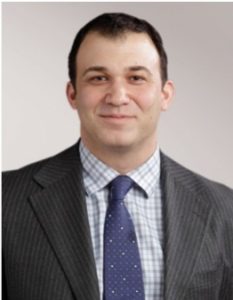Why lawyers of the future will need tech savviness as well as legal know-how
The successful law firms of the future will be those who set a culture of embracing change, rather than shying away from it
October 09, 2018 at 12:00 AM
5 minute read
The release of legal futurologist Professor John Flood's latest academic paper, looking at the potential impact on the legal profession of artificial intelligence, blockchain and other cutting-edge technologies, represents the latest evidence that digitisation is being welcomed in an industry that is renowned for its innate conservatism and often slow to respond to change.
There is still a long road to travel, however, and it will fall to future generations of lawyers to play their part in ensuring these new technologies are fully embraced by, and embedded in, the profession, if they are to deliver the real business benefits beyond the hype.
Professor Flood's paper suggests that law firms generally "lack a scientific base from which to analyse their needs with respect to technology", which translates into lack of partner confidence in making decisions about IT investment. In turn, this can cause hesitancy, delay – and, potentially, loss of competitive advantage. This is why the evolutionary road has been rocky for many firms – and will continue to be unless they learn to bring a more disciplined approach to defining and meeting their technology needs.
A particularly challenging conundrum is where on a spectrum should a firm pitch its next IT investment? Should a firm stay in the comfort zone of the well-established and familiar? Being fearful of venturing beyond current tech platforms that focus mainly on tracking legal work will keep a firm behind the curve. However, forcing progress too quickly – disregarding what a firm's people and culture can cope with – risks a lack of engagement, and huge amounts of wasted money and time. The newer innovations go beyond merely tracking work, toward actually enabling it – and the next generation again takes this further, aiming to reduce legal work, for example, by replacing human lawyers with machine-driven conceptual interpretation.
So lots of market advantages to be gained, but how far into the future should a firm be gazing when making individual IT investment decisions? Firms need tools for assessing where they are now, where they need to get to and, crucially, how they can get there – and they need a new internal language for technology that all staff can understand. Too many firms approach tech investment on a project-by-project basis, rather than designing a cohesive overarching strategy for their tech journey that gets buy-in from the top, and using this as a template for making decisions about individual IT projects and investments.
Once a new internal language is established, everyone at the firm can be encouraged to be creative. Lawyers of the future will set themselves apart and demonstrate their readiness for career progression by blending legal knowledge with tech savviness, suggesting to the business new ways that legal services can be delivered by clever use of technology. They will also be the ones who welcome (rather than fear) the opportunity for technology to completely transform how legal services are delivered, even to the point of changing the very shape of the law business itself.
As legal tech evolves, the smarter law firms will increasingly separate out the different 'strata' of legal services and reassess how each layer is best resourced – whether by humans, by machines, and whether they still need to be housed within the law firm business or law department, or are better situated outside.
 We have seen successful examples already in Thames Water's 'managed legal services' contract with Berwin Leighton Paisner, and subsequently Eversheds Sutherland. And we have seen it more recently with UnitedLex's own project with LeClairRyan, launching ULX Partners. ULX Partners is a shared platform for multiple law firms to benefit not only in technology that is continuously invested in and updated, but also in other resources too, including knowledge management and process innovation know-how.
We have seen successful examples already in Thames Water's 'managed legal services' contract with Berwin Leighton Paisner, and subsequently Eversheds Sutherland. And we have seen it more recently with UnitedLex's own project with LeClairRyan, launching ULX Partners. ULX Partners is a shared platform for multiple law firms to benefit not only in technology that is continuously invested in and updated, but also in other resources too, including knowledge management and process innovation know-how.
According to Professor Flood, this sort of disruption will gradually become the new norm. He sees a future in which law firms operate as 'distributed entities' – different parts of the traditional law firm function being dispersed across various separate business structures and single-project vehicles.
The successful law firms of the future will be those who set a culture of embracing change, rather than shying away from it. And the successful lawyers will be those who are not threatened by this, but can adapt and excel in a very changed – and continually changing – environment.
Jeffrey Catanzaro (pictured) is vice-president of the legal business solutions team at UnitedLex.
- Click here for more from Legal Ladder, our dedicated careers blog to help lawyers and recruiters keep abreast of the key issues facing the profession
NOT FOR REPRINT
© 2025 ALM Global, LLC, All Rights Reserved. Request academic re-use from www.copyright.com. All other uses, submit a request to [email protected]. For more information visit Asset & Logo Licensing.
You Might Like
View All

Will a Market Dominated by Small- to Mid-Cap Deals Give Rise to This Dark Horse US Firm in China?

Big Law Sidelined as Asian IPOs in New York Dominated by Small Cap Listings

X-odus: Why Germany’s Federal Court of Justice and Others Are Leaving X
Trending Stories
- 1We the People?
- 2New York-Based Skadden Team Joins White & Case Group in Mexico City for Citigroup Demerger
- 3No Two Wildfires Alike: Lawyers Take Different Legal Strategies in California
- 4Poop-Themed Dog Toy OK as Parody, but Still Tarnished Jack Daniel’s Brand, Court Says
- 5Meet the New President of NY's Association of Trial Court Jurists
Who Got The Work
J. Brugh Lower of Gibbons has entered an appearance for industrial equipment supplier Devco Corporation in a pending trademark infringement lawsuit. The suit, accusing the defendant of selling knock-off Graco products, was filed Dec. 18 in New Jersey District Court by Rivkin Radler on behalf of Graco Inc. and Graco Minnesota. The case, assigned to U.S. District Judge Zahid N. Quraishi, is 3:24-cv-11294, Graco Inc. et al v. Devco Corporation.
Who Got The Work
Rebecca Maller-Stein and Kent A. Yalowitz of Arnold & Porter Kaye Scholer have entered their appearances for Hanaco Venture Capital and its executives, Lior Prosor and David Frankel, in a pending securities lawsuit. The action, filed on Dec. 24 in New York Southern District Court by Zell, Aron & Co. on behalf of Goldeneye Advisors, accuses the defendants of negligently and fraudulently managing the plaintiff's $1 million investment. The case, assigned to U.S. District Judge Vernon S. Broderick, is 1:24-cv-09918, Goldeneye Advisors, LLC v. Hanaco Venture Capital, Ltd. et al.
Who Got The Work
Attorneys from A&O Shearman has stepped in as defense counsel for Toronto-Dominion Bank and other defendants in a pending securities class action. The suit, filed Dec. 11 in New York Southern District Court by Bleichmar Fonti & Auld, accuses the defendants of concealing the bank's 'pervasive' deficiencies in regards to its compliance with the Bank Secrecy Act and the quality of its anti-money laundering controls. The case, assigned to U.S. District Judge Arun Subramanian, is 1:24-cv-09445, Gonzalez v. The Toronto-Dominion Bank et al.
Who Got The Work
Crown Castle International, a Pennsylvania company providing shared communications infrastructure, has turned to Luke D. Wolf of Gordon Rees Scully Mansukhani to fend off a pending breach-of-contract lawsuit. The court action, filed Nov. 25 in Michigan Eastern District Court by Hooper Hathaway PC on behalf of The Town Residences LLC, accuses Crown Castle of failing to transfer approximately $30,000 in utility payments from T-Mobile in breach of a roof-top lease and assignment agreement. The case, assigned to U.S. District Judge Susan K. Declercq, is 2:24-cv-13131, The Town Residences LLC v. T-Mobile US, Inc. et al.
Who Got The Work
Wilfred P. Coronato and Daniel M. Schwartz of McCarter & English have stepped in as defense counsel to Electrolux Home Products Inc. in a pending product liability lawsuit. The court action, filed Nov. 26 in New York Eastern District Court by Poulos Lopiccolo PC and Nagel Rice LLP on behalf of David Stern, alleges that the defendant's refrigerators’ drawers and shelving repeatedly break and fall apart within months after purchase. The case, assigned to U.S. District Judge Joan M. Azrack, is 2:24-cv-08204, Stern v. Electrolux Home Products, Inc.
Featured Firms
Law Offices of Gary Martin Hays & Associates, P.C.
(470) 294-1674
Law Offices of Mark E. Salomone
(857) 444-6468
Smith & Hassler
(713) 739-1250









